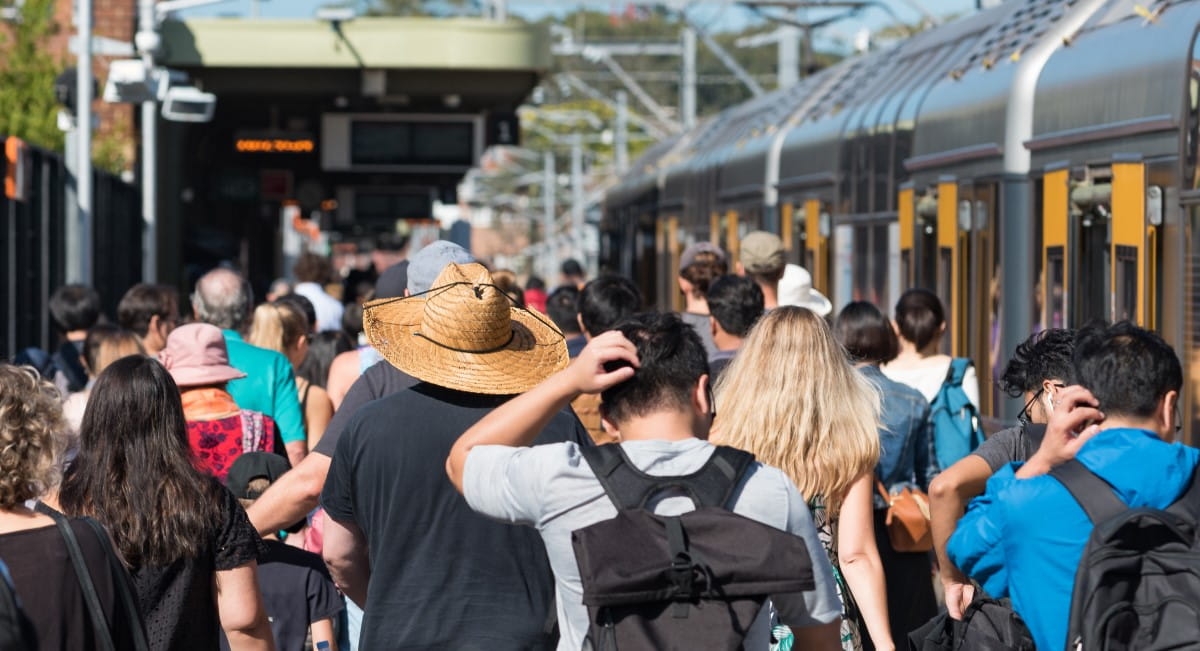“We’re expected to reintegrate with not much in our tank so it's difficult to operate at a functional level. And that's why we're seeing lots of people struggling.”—Justine Alter, Founder, Transitioning Well.
Key points
- As we return to “COVID-normal” after the past few years, getting back to the way things were is proving difficult for many of us.
- Setting your priorities and non-negotiables, and finding transition rituals are just some of the tactics you can use to make work and life more manageable.
- Keep a lookout for the warning signs that indicate your wellbeing might be being affected, and seek help if you need to.
What do you remember about lockdown? If your memories of the Groundhog Day grind are a little blurry, it’s hardly surprising.
With much of Australia effectively grounded for months on end because of the COVID-19 pandemic, the activities and events that delineated our lives were suddenly yanked away. Schools, pubs, gyms, places of worship, football matches, birthday parties, holidays—all these things were suspended or indefinitely postponed. These events are social tent poles that provide structure to our daily lives. Without them, we were forced to adapt to a more shapeless and uncertain way of life.
For many people, this adjustment took its toll, suggests Inouk Mackay, a coach for mental health program MindStep, delivered by Australian Unity’s health division Remedy Healthcare.
“Humans are well hardwired to handle some level of stress or tension,” Inouk explains. “But when things become a daily occurrence and the anxiety intensifies or starts to layer, then it can become too hard to handle and we can quickly feel like we are spiralling out of control. Many people experienced stress, uncertainty, worry, disconnect and, in some cases, a sense of hopelessness or helplessness.”

Back to the grind
Even if you weren’t too badly affected by the lockdown—and the Australian Unity Wellbeing Index found that some groups in society actually thrived—few were sad to see them go.
But this makes the current scenario feel counterintuitive. Ostensibly, life has returned to a vague approximation of how it was before. But instead of being elated at plunging back into the status quo, many of us feel slightly overwhelmed.
While COVID-19 brought its own challenges (home-schooling, anyone?), it did give many Australians extra time back in their day. Suddenly, we’re again confronted by the juggling act of daily life that might include navigating commutes, social events, and school or childcare pick-ups on top of the domestic hurly-burly.
As our schedules overflow once more, how we can make sure we look after the things that affect our wellbeing? How do we keep doing the things that matter to us and find some time for ourselves?
The struggle is real
Justine Alter believes the struggle to adjust to this “new normal” is to be expected. She’s the co-founder of Transitioning Well, a national team of organisational psychologists that help people to manage the messy intersection between work and life.
“It actually doesn't surprise me at all,” Justine admits. “I think what happened was that ability to press pause during lockdown was welcomed, but it was also very stressful and draining for a lot of people because we were in a difficult time of not knowing what was coming. That sense of exhaustion has continued, and it's led to burnout in a lot of people.
“Now we’re expected to reintegrate with not much in our tank so it's difficult to operate at a functional level. And that's why we're seeing lots of people struggling.”
In addition, while the received wisdom is that society is now “back to normal”, that doesn’t reflect the daily reality. COVID-19 cases remain high and continue to sabotage many plans. Meanwhile staff shortages and supply chain issues are causing disruptions or lengthy waits in many sectors. “Right now, just planning simple things for people seems harder,” Justine says.

Practical tips to navigate the “new normal”
As we tentatively feel our way back into the swing of things, there are certain practical steps you can take to make the whirlwind of modern life feel a lot more manageable.
Don’t fall back into autopilot
For many, the COVID-19 lockdowns offered a chance to take stock and reflect. A lot of people spoke of how this opportunity had made them recalibrate their priorities in life and work.
“But you ask those people today, most of them will have just switched straight back into the business of daily life as it was,” Justine says. “Albeit with the added challenges of all the unpredictability we’re continuing to face.”
Try not to let your positive intentions get crushed by the daily grind. Whether you planned to rejig your schedule to create more family time or wanted to continue using your lunch break to take a walk, figure out how to put those plans into action.
“It's very easy to switch back into autopilot,” Justine says. “But think about how you can do things differently and set those intentions. Getting ourselves out of that automatic mode is really important.”
Set your non-negotiables
Hybrid work has only exacerbated the way our personal and professional lives have become inextricably tangled. Meanwhile our 24/7 connectivity brings a never-ending flow of demands and deliverables. The only way to protect yourself from this relentless onslaught is to define your personal boundaries.
“Setting your non-negotiables is about not falling into the trap of trying to please everybody all of the time,” Justine says. “It’s about saying: ‘This is where I'm drawing my line in the sand.’ It's not easy for people to say ‘no’, because you will get pushback. But it is certainly a strategy that we need to use to prevent ourselves from creeping towards burnout.”
Everyone’s non-negotiables will be different. Perhaps you’ll vow to stop checking work emails at 7pm. Or you’ll commit to doing the school pick-up three times a week to spend more time with your kids. But when you find yourself caught in that guilty tug-of-war between life and work, setting your non-negotiables can help you to establish what is most important for you.
“Setting your non-negotiables can help you to make your decisions more intentional,” Justine says.

Find your transition rituals
Most of us have to switch between a number of different roles, including being a worker, parent, carer, or partner. But it’s easy to let the residual stress of one scenario bleed into the next. To prevent that from happening, you need to find a way to “change hats” and realign your headspace.
Finding transition rituals can help to make that process more intentional, Justine says. To switch off from work, for example, you might listen to a podcast or music on your commute, or walk the dog as soon as you get home. “We go through millions of transitions every day,” Justine says. “Having some rituals can help us reset.”
Check the warning signs
If you plunge a frog into boiling water they'll immediately jump out. But if you place them into room-temperature water and slowly heat it up, the frog won't notice and will slowly cook to death. Justine raises this scenario to stress how you need to stay alert to the early signs of burnout.
It’s an idea that Inouk echoes. Mental health issues, she insists, are not confined to anxiety or depression—they can manifest themselves in subtler ways.
“Some of these include feeling tired or more demotivated than usual, eating poorly, reduced exercise, consuming more alcohol or caffeine than usual, becoming stressed or irritable with family or those you live with, poorer sleep quality, difficulty focusing, or not wanting to be around others,” she says. “These are all warning signs that your emotional wellbeing may be in decline.”
Ultimately, you’ve got to look after yourself by monitoring how you’re getting on. If you feel like you’re starting to struggle, it might be time to ramp up your self-care strategies or seek additional support.
“If we don’t act on the things that are making us stressed or unhappy,” Inouk says, “we can’t expect much to ever change.”
Disclaimer: Information provided in this article is not medical advice and you should consult with your healthcare practitioner. Australian Unity accepts no responsibility for the accuracy of any of the opinions, advice, representations or information contained in this publication. Readers should rely on their own advice and enquiries in making decisions affecting their own health, wellbeing or interest. Interviewee titles and employer are cited as at the time of interview and may have changed since publication.
Remedy Healthcare Group Pty Limited and Australian Unity Health Limited are wholly owned subsidiaries of Australian Unity Limited.
An Australian Unity health partner, Remedy Healthcare provides targeted, solution-oriented healthcare that is based on clinically proven techniques. For more than 10 years, Remedy Healthcare has worked with more than 100,000 Australians – helping them to manage their health through caring, coaching, empowerment and support.


